Understanding Depression in Islam: A Holistic Approach to Mental Health

Millions of people battle depression worldwide. It is a difficult and intricate mental health issue. Islam acknowledges depression and offers a multimodal therapeutic method that integrates social, psychological, and spiritual elements.
In order to comprehend depression within the Islamic context, one must acknowledge the advantages of seeking professional help, leading a balanced lifestyle, finding community support, and receiving spiritual guidance. These resources should then be used to manage mental health concerns in a manner that aligns with Islamic teachings and values.
Introduction
Islam acknowledges mental health as a necessary component of a happy, balanced existence. This blog seeks to examine this idea from an Islamic viewpoint, providing an outlook that encourages wellbeing.
The Significance of Mental Health in Islam
- Holistic Perspective: Islam highlights the interdependence of mental, emotional, and spiritual well-being. It is believed that having a sound mind is crucial to realizing your potential as God's created being.
- Quranic Guidance: The Quran reminds us of God's benevolence and the transience of affliction, which gives us peace and comfort.
- Prophetic Example: The Prophet Muhammad (PBUH) advocated for getting support for problems, particularly those pertaining to mental health.

Comprehending Depression:
Identifying the Signs: Depressive symptoms include melancholy, hopelessness, and a loss of interest in once-enjoyed activities.
Causes: Neglecting one's spiritual well-being might be a contributing factor to depression, even if life's problems can also have an impact.
Impact: Your everyday life, relationships, and capacity to maintain a strong spiritual connection can all be profoundly impacted by depression.
An Islamic Perspective on Mental Health
- Islam promotes a well-rounded strategy that combines religious rituals with outside assistance as necessary.
- Reciting the Quran, praying, and interacting with Muslims can all provide courage and hope.
- The Quran serves as a reminder of God's purpose and the idea that ease comes after difficulty.
Recall that you are not alone. We'll go further into Islamic practices and tools that can promote mental health in this blog post. Additionally, it will look at how to include expert assistance in your quest for a happier and healthier life.
The Concept of Mental Health in Islam
- Beyond Physical Health, Islam acknowledges a holistic state of health that includes mental, spiritual, and physical aspects.
- Mental wellness is a condition of flourishing that enables you to carry out your job as a creation of Allah (SWT), not only the absence of mental sickness.
- The nature of the self (nafs) is a topic covered in Islamic teachings. The nafs is the self, complete with wants and the capacity for both good and evil. Promoting positive traits and working toward spiritual cleansing are essential components of mental wellness.
Islam's Holistic Perspective on Well-Being
Islam places a strong emphasis on living a balanced existence. Sustaining optimal physical health with a nutritious diet and regular exercise promotes mental wellness. The soul is fed by spiritual disciplines like prayer and almsgiving.
Having close relationships with family and the Muslim community helps one feel secure and purposeful by giving them a sense of support from others and a sense of belonging.
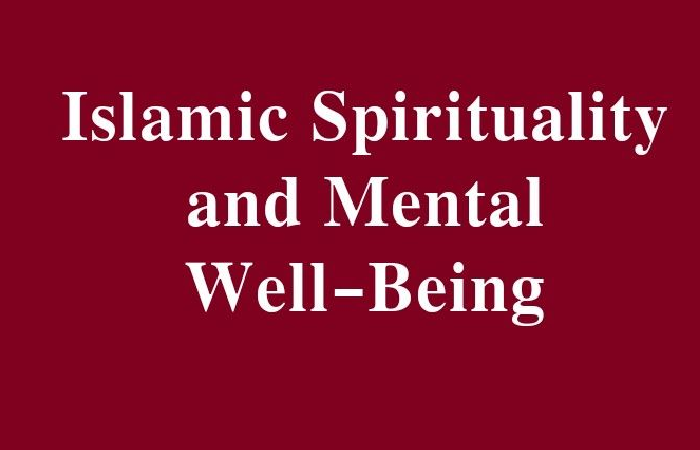
The Islamic Viewpoint on Mental Health
Verses of comfort and hope: The Quran provides consolation during tough times by serving as a reminder of Allah's (SWT) mercy and the transience of hardship.
Resilience is based on verses such as "Surely, with hardship comes ease" (Quran 94:5).
Prophetic Tales: The Quran tells the tales of prophets like as Prophet Muhammad (PBUH) and Job, showing that even the virtuous face difficulties but are strengthened by their faith.
Hadiths and Prophecy-Related Instructions for Mental Health
It Is Encouraged to Seek Help: The Prophet Muhammad (PBUH) stressed the significance of obtaining assistance for problems, particularly those pertaining to mental health.
Activities for Mental calm: According to hadiths, reciting the Quran aloud, praying, and making supplications are effective ways to overcome anxiety and foster inner calm.
Understanding Depression
Depression is a serious yet common mood disorder that can significantly affect your daily life. In this blog, We will define depression, describe how it's categorized, teach you how to recognize its symptoms, and emphasize the value of seeking professional help.
Meaning
Depression is characterized by:
- Loss of interest
- Indifference, and
- Persistent feelings of hopelessness.
Sometimes referred to as major depressive disease. It is described as temporary emotional responses to life's experiences. This can have a adverse effect on relationships, work, and health in general.

Types Of Depression:
- Major depressive disorder: The primary symptoms of major depressive disorder, the most common type, last for at least two weeks.
- Dysthymia: This is a milder form of chronic depression. It can last for at least two years.
- SAD or Seasonal affective disorder: This type of depression typically occurs in the winter when there is less sunlight.
- Peripartum depression: It is a type of depression that affects women during pregnancy or after childbirth.
Symptoms Of Depression:
Although sadness is a common symptom of depression, people may experience:
- Extended despondency, helplessness, numbness, or a feeling of emptiness.
- A reduction in motivation and a sense of discontent with activities that one used to enjoy.
- Notable weight gain or loss due to dietary adjustments.
- Sleeping too much or for too long.
- Psychomotor Alterations can manifest as restlessness, lethargy, or trouble focusing.
- Feelings of worthlessness include excessive self-criticism, regret, and feeling burdened by others.
- Suicidal thoughts or ideas: Death-related or suicidal thoughts or ideas that persist.
The Significance of Seeking Expert Assistance
Depression can be treated with medicine. It is a must that you seek expert assistance if you are experiencing these symptoms. A professional, who specializes in the kind of depression you face, can diagnose you. He can develop a treatment plan for you that might involve counseling, medication, or both.
A few resources to get you started are as follows:
The National Alliance on Mental Illness: www.nami.org/home.
The National Suicide Prevention Lifeline: 988 (US).
Helplines for non-residents of US: https://www.iasp.info
Remember that you are not by yourself. There is assistance available for depression, which is a prevalent condition. Taking action and obtaining expert assistance can change your life.
Coping Strategies from Islamic Teachings
Islamic customs can act as pillars in trying times. Here, we'll explore the significance of Islamic support systems and counseling, the effectiveness of prayer, dua (supplication), and dhikr (remembering Allah).
Seeking Solace via Dua and Prayer:
Prayer as a Foundation of Strength: Islam's five daily prayers offer order, regularity, and a direct line of communication with Allah (SWT). During trying circumstances, concentrating on prayer can bring you a sense of serenity and inner peace.
Dua: An Interaction with the Almighty We can express our deepest desires to Allah (SWT) through supplication, asking for His strength, consolation, and direction. Islamic writings have specific duas for anxiety, depression, and other issues.
The following are some duas for mental health:
For Anxiety Relief:
"Allahuma inni a'udhu bika minal-hammi wal-hazani wal-'ajzi wal-kasli wal-bukhli wal-jubni wa dhala'id-dayni wa ghalabatir-rijal." (O Allah, I run to You for solace from anxiety, melancholy, powerlessness, sloth, miserliness, cowardice, debt, and the enslavement of people.)
"Hasbiyallahu la ilaha illa huwa 'alayhi tawakkaltu wa huwa Rabb al-Arshi al-Azeem" is a prayer for strength and hope. (Allah is sufficient for me; He is the Lord of the Mighty Throne and the one deity [deserving of worship] that I trust in.)
The significance of Dhikr, or remembering Allah:
Reciting Quranic passages on a regular basis, together with
- Tasbeeh (saying Subhanallah)
- Tahmeed (saying Alhamdulillah) and
- Tahlil (saying La ilaha illallah)
These azkaar might help to calm the heart by serving as a constant reminder of Allah's (SWT) mercy and presence. Anxiety can be reduced and comforted by this recitation.

Utilizing Islamic Counseling and Support Networks
- The teachings of the Quran and the Sunnah of Prophet Muhammad's (PBUH) serves as guidelines for Islamic scholars and imams. They can offer spiritual guidance and support based on them.
- Mosques and Islamic centers can act as hubs for get-togethers and support groups. In these places you can meet people going through similar situations.
Remember:
- These techniques must be used in addition to expert advice. They should not be used as a substitute for them.
- If you are having mental health problems, it is essential that you get professional help from a therapist or counselor.
- Each person has a unique journey. A solution that suits one person might not suit another. Seek out solutions that will bring you joy and closer to Allah (SWT).
- By incorporating these Islamic rituals into your life, you can strengthen your inner fortitude. You can find solace in your faith. Build a support system that empowers you on your journey to mental wellbeing.

Autism: Understanding the Spectrum
For people with autism, empathy and support are essential aspects of daily life. It is imperative that society acknowledge the distinct advantages and obstacles faced by people with autism and establish the required support networks for them. People with autism might have a sense of empowerment and value when they live in an inclusive and accepting community.
Support can take many different forms, such as community involvement, therapy services, and modifications for schooling. Dispelling myths and prejudices about autism is crucial to raising awareness and understanding of the condition in society. By raising awareness, we can provide a setting that accepts the various requirements of people with autism and enables them to realize their full potential.
Recognizing the difficulties experienced by people with autism and offering the required assistance creates the foundation for an inclusive society that celebrates variety and recognizes the distinctive contributions of each and every person, regardless of ability.
Definition and Characteristics of Autism
Often referred to as autism spectrum disorder (ASD), autism is a neurological condition. It is characterised by persistent issues with communication, social interaction, and repetitive behavioral patterns. Since it is a spectrum disorder, every person will experience it in a unique way. While some autistic individuals might do well in particular professions, others might find it difficult to manage other facets of daily life.
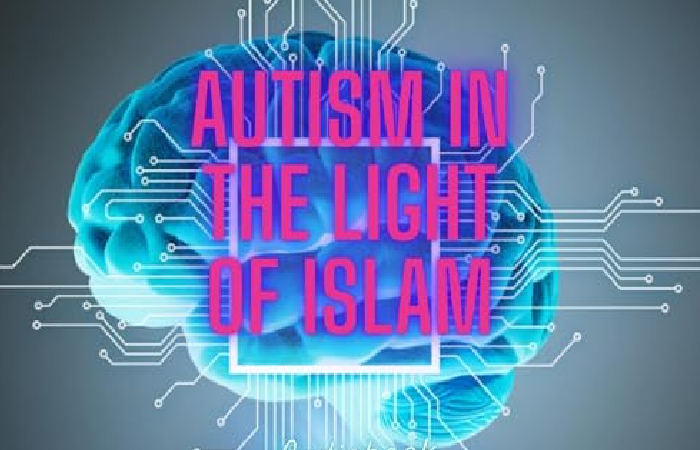
Challenges Faced by Individuals with Autism
Individuals diagnosed with autism face numerous difficulties on a daily basis. These issues may arise from difficulty with communication and social interaction.
-
They could find it difficult to keep eye contact, decipher social cues, express themselves, and comprehend emotions.
-
Furthermore, autism sufferers may have issues related to sensory sensitivity—the sensitivity to particular textures or loud noises, for example.
-
For people with autism, consistency and predictability are essential. Any alterations or disturbances can cause worry and panic.
-
They might struggle to adjust to strange surroundings or unforeseen circumstances.
-
Because they might need extra assistance and accommodations to succeed, people with autism might suffer in academic environments.
Islamic Perspective on Inclusion and Support for People with Autism
Islam emphasizes tolerance, acceptance, and the intrinsic worth of every person. This translates wonderfully to the Muslim community supporting and including those with Autism Spectrum Disorder (ASD).
Fundamental Islamic Principles Promoting Inclusion
- Regardless of one's aptitude, the Quran underscores that all individuals are created equal before Allah (SWT). This establishes the groundwork for treating everyone with respect and decency.
- Kindness and understanding were embodied by the Prophet Muhammad (PBUH). He placed a strong emphasis on being kind to others, especially those who are struggling. This immediately affects people who are autistic.
- Strong, supportive communities are encouraged by Islam. Islamic organizations and mosques can serve as hubs of support, providing a warm environment for people with ASD and their families.
Examining Autism Through an Islamic Perspective:
- According to Islam, Allah (SWT) made everyone of us uniquely. People with ASD have distinctive traits that can be viewed as assets and important contributions to the community.
- One can view life's experiences—including disabilities—as testing from Allah (SWT). When confronted with obstacles, perseverance and knowledge-seeking are encouraged.
The necessity for autism support services and special education programs is recognized by Islamic communities. Islamic institutions, including mosques, have developed programs specifically designed to meet the needs of people with autism spectrum disorders. These initiatives may consist of:
Islamic Schools: To meet the educational needs of pupils with autism, a number of Islamic schools have created customized programs or classrooms that combine Arabic values with tailored training. The learning environment in these schools is supportive.
Physiotherapy therapies: collaborating with medical specialists to provide therapeutic treatments within the Islamic community, including behavior analysts, occupational therapists, and speech therapists. These therapies can support autistic people in overcoming obstacles and developing the necessary abilities.
Parent Support Groups: Offering forums for parents and other caregivers of people with autism to share their experiences and receive advice by setting up seminars and support groups.
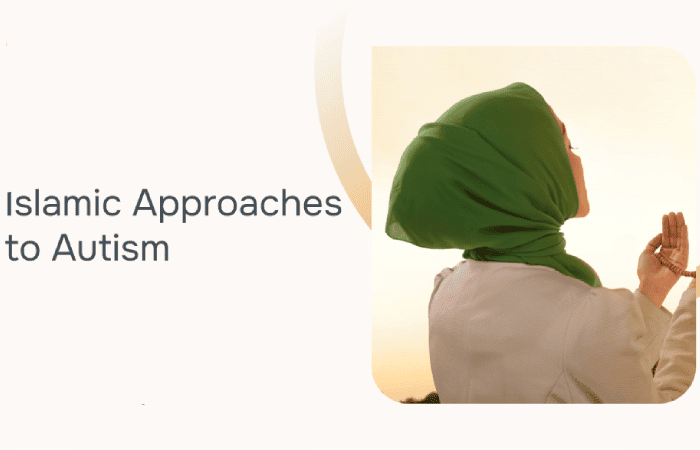
Involving the Public and Sharing Knowledge
Education about autism must reach Islamic communities in order to promote tolerance, acceptance, and support. Mosques and other Islamic institutions involve the community in an active way through:
Programs for Education: Planning talks, seminars, and workshops to inform the public about autism, its difficulties, and strategies for helping those who are on the spectrum.
Hosting Inclusive Events: Organizing fun, accessible activities and events that support social integration and community involvement for people with autism is essential.
Collaborating with groups that assist those with autism: To ensure that the support given meets the needs of people with autism, collaboration with organizations that share resources, knowledge, and best practices is required.
Islamic communities may foster an environment where people with autism feel appreciated, supported, and completely integrated into the religious and social fabric of the community by embracing inclusion and offering the appropriate support.
Establishing a welcoming environment at the mosque:
For Muslims, mosques are essential places for prayer, social interaction, and spiritual development. There have been initiatives to make mosques more accessible and to provide accommodations for people with autism. Mosques are urged to foster an inclusive atmosphere by providing:
- Sensory Considerations: Designating specific areas for calm or offering headphones with noise cancellation capabilities can improve accessibility for religious activities and prayer.
- Visual Supports: For people with ASD who process information visually, using visual aids and well-defined routines might be beneficial.
- Training and Awareness: Raising awareness of autism among mosque leaders and members can help to create a more accepting and understanding atmosphere.
Remember:
- Individuals with ASD have a diverse variety of abilities. Giving them the chance to engage and make a contribution benefits the community as a whole.
- Each individual on the autistic spectrum is different. Support and accommodations must be customized to meet each person's needs.
- Families, mosques, and Islamic organizations may all work together to create a truly inclusive and uplifting atmosphere for everybody.
We can make sure that people with ASD feel respected, accepted, and supported in the Muslim community by adopting Islamic values of compassion, understanding, and creating a strong community.
Comprehending the Islamic viewpoint on autism lays the groundwork for assisting those with autism in Islamic societies. Islamic communities may foster a positive atmosphere that upholds the values of inclusivity, acceptance, and acknowledging unique qualities in individuals with autism.
Addressing Mental Health Needs in Muslim Communities
Encouragement of Acceptance and Inclusivity
A major emphasis on increasing community knowledge and offering assistance is necessary to create a more accepting and inclusive society for people with mental health issues. Fostering inclusiveness requires accepting difference, educating the community, and offering both practical and emotional support.
Acknowledging Variations
Embracing diversity is essential to fostering an environment that welcomes people with mental health issues. Regardless of neurodiversity, it implies that each person's special traits and skills ought to be respected and recognized. We might be able to assist in removing obstacles and moving toward a more inclusive society by encouraging diversity acceptance and celebration.
Providing Public Education
To increase societal acceptance and knowledge, education is essential. By dispelling stereotypes and stigmatizing mental health, we can assist break down social barriers and provide factual information about the condition, its symptoms, and the difficulties experienced by persons who have it. A few examples of educational programs targeted at improving community members' understanding and empathy are workshops, seminars, and awareness campaigns. We can enable people to support and include those who have mental health issues into their everyday lives by arming them with information and resources about the disease.
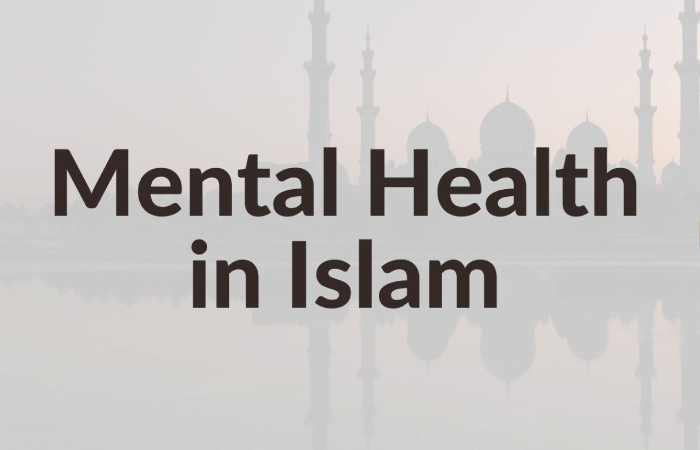
Awareness and Education Are Important:
- It's important to have honest discussions about mental health issues in order to debunk stigmas and inspire people to get treatment without feeling guilty.
- Better results can be achieved when people and communities are more aware of the indicators of depression and take appropriate action as soon as possible.
- Gaining knowledge about mental health promotes compassion and empathy for people who are experiencing difficulties.
Creating Inclusive and Supportive Environments:
Establishing Safe Spaces: It's critical to create settings where individuals feel at ease discussing their mental health. Homes, companies, schools, and religious organizations can all accomplish this.
Active Listening: Establish a space for candid conversation by listening intently and without passing judgment.
Creating a Support Network: To find support and strength, urge them to get in touch with friends, family, and support groups.
Encouraging Mental Health Resource Accessibility:
Lowering Financial Barriers: To guarantee that everyone has access to treatment, push for reasonably priced or subsidized mental health services.
Language Accessibility: To reach a variety of communities, make sure materials and information are available in several languages.
Online services: support groups, and telehealth options should be promoted in order to improve accessible for individuals with mobility or geographic constraints.
Case Studies and Personal Reflections
It's not always easy to identify depression in those with autism. Additionally, treating the illness is not always easy and can involve making tough choices for medical professionals.
A short research conducted in December 2017 discovered that ADEPT, an adapted, guided self-help variant of CBT, is well-liked by both therapists and autistic individuals who are depressed. Nine therapy sessions were attended by the seventy participants. Rather of conducting the sessions, the therapists just guided the clients to look into connections between their feelings and the self-help tasks they had finished, enabling them to make positive life changes.
Clinical psychologist Ailsa Russell of the Centre for Applied Autism Research at the University of Bath in the United Kingdom, who oversaw the ADEPT trial, says that it is critical that individuals with autism be able to choose from a variety of effective treatment options.
Case Study Of Hector And Nocholas
Hector's therapist assisted her in comprehending the significance of her autism diagnosis and the ways in which it affected her life. Hector's despair was then discussed by the therapist.
Hector was well enough to become a neurodiversity and inclusion consultant with continued therapy. She married in August 2018 and purchased a home.
"I never imagined that I would be able to leave New York City or be approved for a mortgage. I've wanted it since I was sixteen," Hector explains.
Nicholas is pursuing personal ambitions. In addition to looking for work, he is considering attending college. He no longer requires as much assistance, according to his mother. She is making an effort to back off, but she says it is challenging because he is not making as much progress as he could be.
Nevertheless, he is improving. Nicholas is still taking antidepressants and participating in cognitive behavioral therapy (CBT) with his therapist this summer. It hasn't had any detrimental consequences on him.
He says, "I'm attempting to keep myself active right now so I don't end up in a slump." "I like to be busy so that I don't feel like I'm wasting my life away. I'm organizing my approach.
Insights Gained
Some signs of depression, such social withdrawal, are mistakenly thought to be a feature of autism. Fatigue, restlessness, and stomachaches are among the physical problems that frequently accompany autism that might also be signs of depression.
Aggression, self-harm, and impatience are among the characteristics of autism that can occasionally be made worse by depression. A complex clinical picture results from the hidden nature of sadness and its comorbidity with features of autism. It's still early to validate tools to detect depression in autistic people.
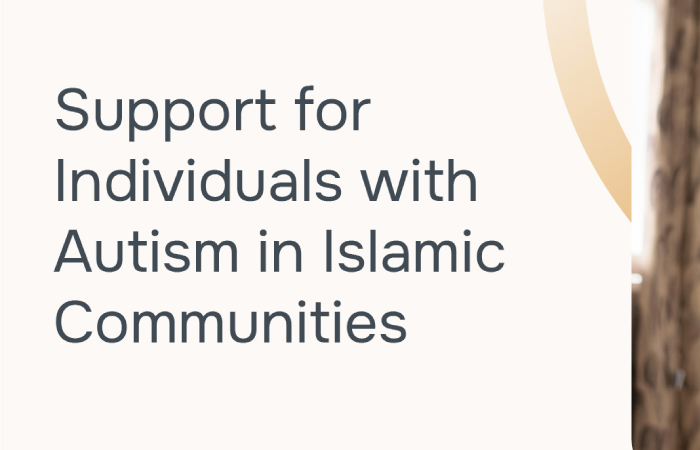
Overcoming Challenges Through Faith
For those suffering from autism or depression, faith can be a potent source of support and encouragement. Here are some motivational stories:
The Story of Sarah (Depression):
For years, Sarah, a young lady, struggled with depression. She was surrounded by feelings of loneliness and worthlessness. She rediscovered her faith one day.
Verse after verse about God's benevolence and the transience of affliction struck a deep chord with me as I reread the Quran, she says.
She started making prayer a regular part of her day because she found solace in its structure and sense of belonging to something greater than herself. Hope flashed inside her slowly. Sarah combined her religious rituals and therapy with outside assistance. Though the path wasn't easy, Sarah emerged stronger and with a rejuvenated spirit thanks to her professional assistance and faith.
The Autism Story of Ahmed:
Ahmed was an autistic youngster who had difficulty interacting with others and coping with excessive sensory input. He was intimidated by the mosque's strange routines and noises.
His parents made the decision to carefully introduce him since they recognized the value of community. They discussed Ahmed's needs with the Imam, and they jointly set up a private area in the mosque where Ahmed could pray at his own speed.
In order to improve Ahmed's understanding of the sermons, the Imam also included visual aids. The mosque gradually changed from a terrifying location to a secure shelter. Ahmed had a feeling of acceptance as the welcoming community acknowledged his special talents.
These are only two of the innumerable tales of how faith gives people strength.
- Faith serves as a reminder that we are a part of something bigger than ourselves, giving us a sense of purpose and belonging.
- During trying times, prayer and spiritual activities can provide consolation, comfort, and a sense of inner calm.
- Religious traditions frequently place a strong emphasis on optimism and fortitude, serving as a constant reminder that better days are coming.
Conclusion
This post examined mental health from an Islamic viewpoint, emphasizing the value of wellbeing, the distinctions between autism and depression, and the ability of faith to overcome adversity.
Important Things to Bear in Mind:
Islam places a strong emphasis on achieving wholeness, which includes mental, emotional, and spiritual well-being.
The importance of mental and physical wellness is equal. Autism and depression are real illnesses, not weaknesses.
Islamic beliefs urge seeking professional assistance. Integrating spiritual practices with counseling and medicine can be a successful strategy.
By encouraging inclusivity, offering resources, and establishing secure spaces for candid discussions, faith groups may be a potent source of support.
The following are some ways that you can help raise awareness of mental health issues in Muslim communities:
- Be informed about mental health issues and how to assist individuals who are experiencing them.
- Openly discuss mental health issues with loved ones, friends, and other members of your mosque community.
- Busting misconceptions and fostering compassion can inspire people to ask for assistance without feeling guilty.
- Encourage programs that give Muslims access to mental health resources that are suitable for their language and culture.
Everybody has a part to play in building a future in Muslim communities where mental health is respected and encouraged. Together, we can create a more accepting and caring atmosphere where everyone is encouraged to ask for assistance and realize their full potential.





